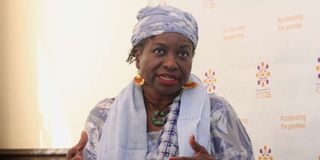25 years after Beijing, no country has fulfilled commitments

Dr Natalia Kanem, executive director UNFPA. She says everyone should back up words and policies with deeds and funding for programs, services that transform women’s lives.
What you need to know:
- The1995 document crucially commits governments, international community and civil society to act on women’s poverty, armed conflict, education, and health and end violence against them.
- A report states that although there have been advances in women’s and girls’ rights since the adoption of the Beijing Platform for Action, progress has been far too slow and uneven.
- Data from UNFPA inform that only 55 per cent of women, worldwide, can make their own decisions about sexual and reproductive health and contraception.
“Everyone should back up words and policies with deeds and funding for programs and services that transform women’s lives.”
This was the message of Dr Natalia Kanem, executive director of United Nations Population Fund (UNFPA) when she addressed the 75th session of UN General Assembly (UNGA75) recently.
The Assembly convened a high-level meeting to commemorate 25th anniversary of the historic Fourth World Conference on Women, when the 12-strategic women and girl empowerment actions named Beijing Declaration and Platform for Action were adopted.
Progress slow
The 1995 document crucially commits governments, international community and civil society, including non-governmental organisations and the private sector to act on women’s poverty, armed conflict, education, and health and end violence against them.
UN Women ‘analysis on progress made 25 years later, however shows not a single country has fully fulfilled the commitments.
The Women´s Rights in Review 25 years after Beijing report states that although there have been advances in women’s and girls’ rights since the adoption of the Beijing Platform for Action, progress has been far too slow and uneven.
Adoption of the declaration
It reports that globally, progress on women’s access to paid work has ground to a halt over the past 20 years, and that less than 62 per cent of women aged 25-54 are in the labour force, compared to 93 per cent men.
Meanwhile, women and girls continue to face similar challenges as before the adoption of the declaration.
Dr Kanem said: “Somewhere today, a girl will wake up to discover she is expected to undergo a ritual and in a few hours, she will undergo female genital mutilation.”
Similarly, “Somewhere else, a five-year-old overhears her parents complaining that the girl is a burden compared to a son and in a few years, they will marry her to an older person to ease that burden.”
Sexual and reproductive health
Now, collective action is more urgent to eliminate all inequalities hindering a change in women’s and girls’ lives across the world, she emphasised.
Data from UNFPA inform that only 55 per cent of women, worldwide, can make their own decisions about sexual and reproductive health and contraception.
While more than 800 women still die every day from preventable conditions of pregnancy and childbirth, implying to an urgency for maternal health investments to lower the death rates.
“We still have a long way to go,” she said.
China’s President Xi Jinping, in a video message, pledged $10 million to UN Women in the coming five years to support its work.

UN Women executive director Ms Phumzile Mlambo Ngcuka says it is time to take bold steps to achieve the Beijing commitments.
He recognised the fact that there is much yet to be done to create an inclusive society where women are free from any form of discrimination
“Let’s redouble our efforts to promote gender equality and advance global cause of women development,” he said.
UN Women executive director Ms Phumzile Mlambo Ngcuka said it was time to take bold steps to achieve the Beijing commitments.
“With bold leadership must come unwavering political will, proportionate to the challenges,” she said.
That “urgent investments to back the statements; especially in women organisations, young feminists leading change and women’s ministries and agencies,” are equally made, she stated.





